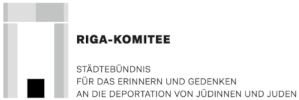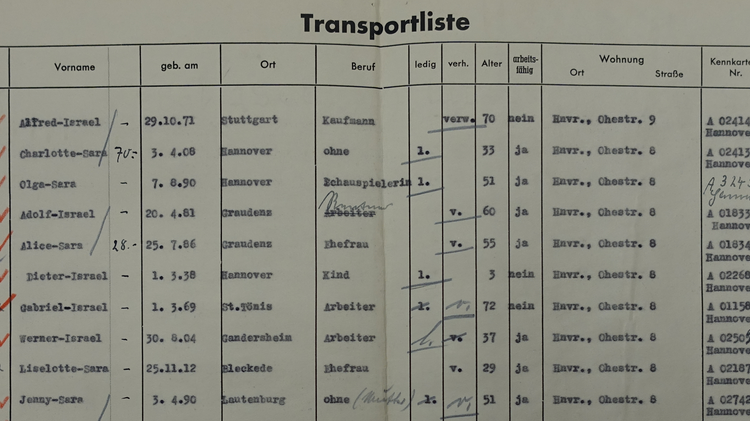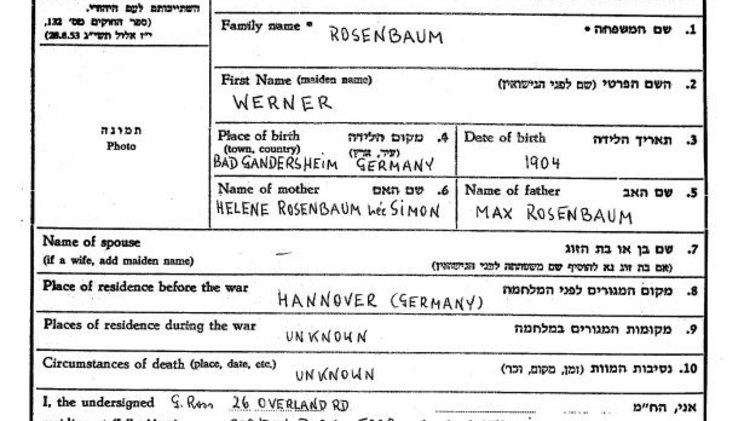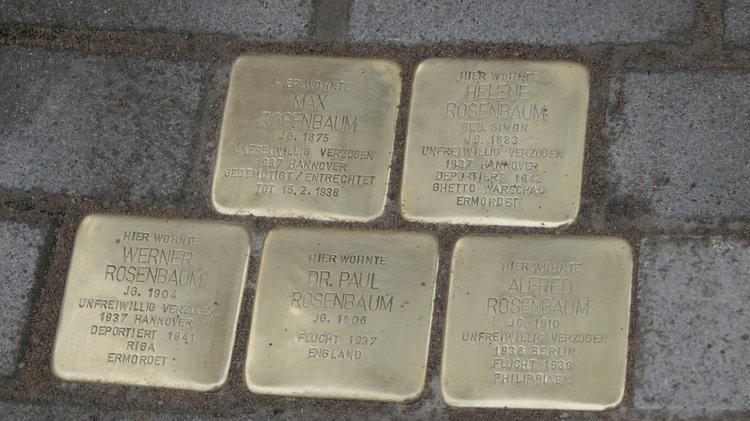Memoirs of Werner Rosenbaum
Memoirs of Werner Rosenbaum
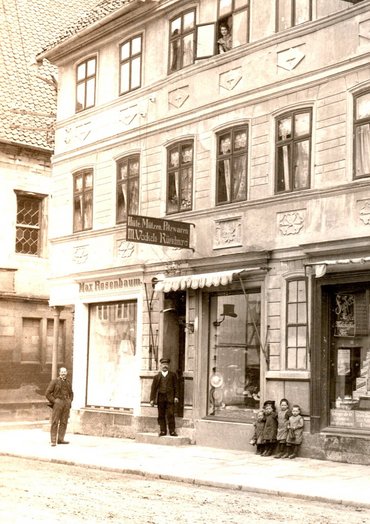
Werner Rosenbaum was born on 30 August 1904 in Bad Gandersheim. His father Max Rosenbaum and his mother Helene Rosenbaum, born as Helene Simon in Seesen,
were married in 1903. On 4 May 1903 Max Rosenbaum registered a "trade in manufactured goods" in Bad Gandersheim. He runs two shops "with foreign products" in Moritzstraße. The Rosenbaum family is part of the Jewish community in neighbouring Seesen.
Werner's younger brothers Paul, born on 6 April 1906, and Alfred, born on 5 November 1910, attend the grammar school. Nothing is known about Werner's school education. He later works in his parents' business.
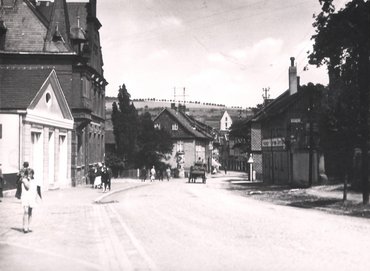
Paul attended the Gandersheim grammar school from 1916 to 1922. After graduating from high school, he begins to study medicine.
In 1922, Max and Helene Rosenbaum purchase the house and property at Neue Straße No. 1. Max has an extension added to the partially rented building on the Moritzstraße side. Here he sets up his shop for manufactured goods, sewing machines, bicycles and woollen goods. In 1928, the "Max Rosenbaum Company" celebrates its 25th anniversary. On 3 February 1931, Max transfers his business to his wife Helene. One year later, the residential and commercial building is transferred to his son Werner.
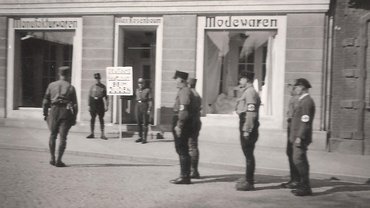
The Gandersheimer Kreisblatt publishes the call for a boycott of Jewish businesses by the NSDAP district leadership and the Gandersheim local group for 1 April 1933.
The action, propagated as a "government measure to protect the people and the nation", is also carried out by the SA in Gandersheim. According to reports in the Kreisblatt, the Rosenbaum family keeps their shop open despite requests and SA posts set up in front of the entrance.
Paul Rosenbaum
His brother Paul Rosenbaum completes his medical studies in 1930 and passes his "Doktor=Examen at the Düsseldorf Hospital Institutes". From 25 May 1934 he lives in Mönchengladbach. In 1935 Paul marries Gertrud Weyl, a Jewish woman from Mönchengladbach. Paul and Gertrud Rosenbaum leave Germany in 1937. According to the residents' registration file, they emigrate to England on 15 July 1937. Paul presumably joins the British Army as a military doctor. In the event of Paul being taken prisoner by the National Socialists, Paul and Gertrud change their name to "Ross". According to contemporary witnesses, Paul stays in Bad Gandersheim as a British soldier after 1945.
Alfred Rosenbaum
His brother Alfred Rosenbaum leaves the Gandersheim Gymnasium at Easter 1932 without taking his Abitur. According to his residents' registration file, he emigrates to the Philippines on 25 January 1939 - whether his escape from Germany actually succeeds is not known.
From Bad Gandersheim to Hanover
On 13 July 1933 - about three months after the boycott - Helene Rosenbaum deregisters her business. The business is abandoned, but the house remains in Werner Rosenbaum's possession for the time being. Helene and Max seem to live off the house's rental income in the following years.In 1937, the house is presumably sold to the Gandersheim district community association for far less than its value as part of the "Aryanisation" and is then used by the NSDAP district leadership. The forced sale of the house at the latest drives Max and Helene to move to a larger town. They move to Hanover on 25 November 1937. Max dies there on 15 February 1938 at the age of 61.
Emigration plans fall through
Werner Rosenbaum is de-registered from Gandersheim on 24 July 1933 with the destination Hanover Ahlem. He begins training as a gardener at the "Israelitische Gartenbauschule Ahlem". Since its foundation in 1893, the vocational school has offered Jewish apprentices training as gardeners and in craft and agricultural professions. Already during the Weimar Republic and especially from 1933 onwards, numerous former students emigrated to Palestine. Werner Rosenbaum also seems to have been preparing his emigration to Palestine as early as 1933. Together with his fiancée Lotte Lenneberg from Mönchengladbach, he plans to emigrate to Italy by 1936 at the latest. The emigration authorities give their consent, and his brother Paul assures him of financial support at the end of 1935. However, the plan falls through in the summer of 1937 when Lotte Lenneberg decides, for unknown reasons, not to emigrate together.
escape together. Although Paul Rosenbaum assures his financial support for an emigration to Palestine at the state tax office, Werner Rosenbaum cannot leave Germany. The reason given is that the original conditions for the joint emigration no longer apply.
Deportation to the Riga Ghetto
At the beginning of September 1941, the Jews living in Hanover are forced to move into one of the 16 "Judenhäuser". More than 1,200 people have to leave their homes within a few hours.
leave their homes in a matter of hours. The house at Ohestraße 8, where Werner Rosenbaum has lived with his mother Helene since 2 April 1940, is also declared a "Judenhaus". The Jewish woman Lieselotte Rosen, Werner's fiancée from Bleckede, and her son Dieter Rosen, born in Hanover on 1 March 1938, are also forced to move to Ohestraße 8 on 4 September. The cramped living conditions do not allow for any privacy. On 17 November 1941 Werner Rosenbaum marries Lieselotte Rosen, born in Bleckede on 25 November 1912. Presumably they receive notification of their deportation immediately before their marriage. A destination is not mentioned.
The first deportation from Hanover to Riga takes place on 15 December 1941. Four days earlier, Werner, Lieselotte and 3-year-old Dieter also have to report to the assembly point on the grounds of the "Israelitische Gartenbauschule Ahlem".
"Israelite Horticultural School in Ahlem. 1,001 people are registered by the Hanover Gestapo. On the morning of 15 December they are driven by lorry to Hanover-Linden railway station. The deportees do not know their destination. After three days, the unheated passenger train arrives at the Riga-Skirotava freight station. It is not certain whether Werner, Lieselotte and Dieter reached the ghetto. Often, deportees are already picked out at the arrival station Skirotava and shot in the forest. Those living in the ghetto have to do forced labour. Again and again there are "selections" in which many people are killed. Among the 69 known survivors of the 1001 deportees on 15 December, there is no member of the Rosenbaum family. Werner Rosenbaum is declared dead in Hanover on 8 May 1945.
His mother Helene Rosenbaum lives in the "Judenhaus" at Ohestraße 8 until March 1942. On 26 March she has to go to the "Israelite Horticultural School Ahlem" to register with 491 other Jewish citizens. They are deported from the Hanover-Linden railway station to the Warsaw Ghetto on 31 March. The conditions in the Warsaw Ghetto are extremely cruel for the internees. Many people die of hunger or from epidemics. No survivor from the transport from Hanover is known. Helene Rosenbaum is declared dead in Hanover on 8 May 1945.
